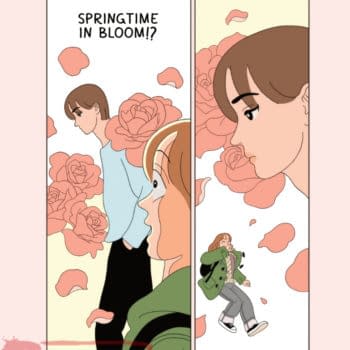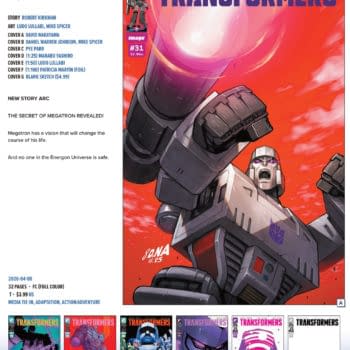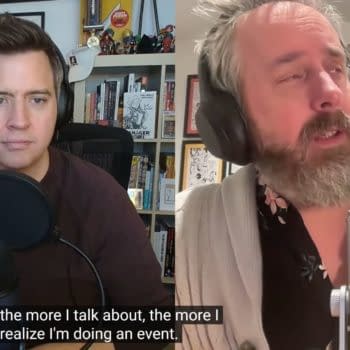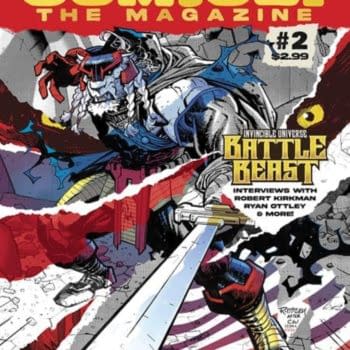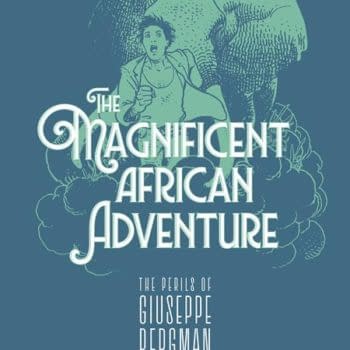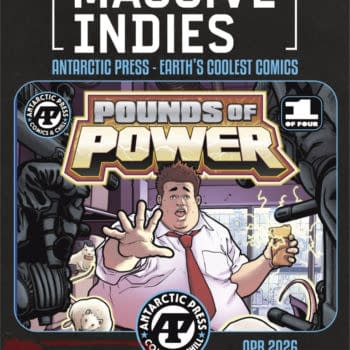Posted in: Comics, Recent Updates | Tagged: avatar press, caanan white, Comics, entertainment, kieron gillen, uber, wwii
Things Get 'Double Zappy' For Uber – Kieron Gillen Talks To Bleeding Cool (SPOILERS)
Tom W. Huxley recently sat down with writer Kieron Gillen to discuss his ongoing Avatar series, Uber with Caanan White, for a forthcoming feature in Bleeding Cool Magazine. Here's a sneak peek as we talk through the ramifications of last week's huge turning point and this week's new arc in issue twelve out today. Spoiler goggles at the ready as we go into the details of issue eleven right from the off – and this one's a shocker.
Tom W Huxley: What's coming up in Uber?
Kieron Gillen: Issue eleven is the end of season one. It's enormous; it's this ridiculous over-the-top game-changer. Issue eleven is one of those ones where I genuinely can't believe I've done that, in a full on Red Wedding fashion. Uber is a book I've always been proud of, but from then it becomes something else.
Issue eleven is a terror attack on Britain, a second blitz. It introduces the Heavy Tank Men, and they get squashed, after a big fight with Sieglinde. What is notable is we kill Churchill, put his head on top of Nelson's Column as a gesture. Churchill's dead.
At the same time Siegmund is having dinner with Hitler. Siegmund is a survivor of Stalingrad, and he's been hiding it. He works out a way to assassinate Hitler with a fake heart attack by tweaking a valve in his chest, so we've killed Hitler as well.
TWH: So quite a game-changer then!
KG: We've stepped off the map, and we tease out the initial response. I've always said it's alternative history, and this is moreso. The trick is that despite doing this, we're still actively interested in World War 2. That we've killed Churchill and Hitler doesn't mean they're truly off the stage.
Issue twelve follows the new battleship, Cohen, a very young, petite Jewish nurse. She very rapidly changes. She's monstrous, she's like a pretty enormous tumour creature. She actually gets named 'HMS Churchill' because she wasn't sent into battle; they didn't think she was ready. Churchill said "no don't, we need her more than we need me."
We dig into Stephanie's background in the next issue, with a brief appearance by Virginia Woolf, weirdly. It sort of changes, in that you start to bring in lots of stuff which people perhaps wouldn't even expect to bring. Essentially with Stephanie I'm talking about my typical interest in feminism, and literature, and people who lie. Stephanie's always lying, that's kind of her thing.
I suppose we start digging more into the characters as well. Issue twelve is Maria. I'm doing my semi-Dostoyevsky issue; it's all told from the position of these peasants. She's from the Ukraine, and there's a pointed, potted history of the Ukraine and Russia at that point. It digs into her anarchist background because her grandparents were anarchists in the Russian revolution.
After writing that, the whole thing that's happening [in the here and now] at Ukraine made me completely go "Oh, Great. This is going to be more controversial than I was planning." I'm touching on things like the Holodomor, which was the mass starvation of people in the Ukraine, due to Stalin's orders essentially. You can pick over history in a variety of ways, but that's brought in. I've had to tweak the script quite carefully to make it clear that I'm talking about the period, and not actually commenting about the present situation. I'd be fine if I'd planned it to be a comment, but it simply isn't.
TWH: Is that going to affect the way you write future issues, do you think?
KG: Hopefully not. I think there's a parallel just because humans are involved with humans, and I think the fact that it's still happening underlines my core point: we are still living in the shadow of World War II.
One of the reasons I wrote Uber was the sense is we're becoming somewhat distant to the idea of Nazis. They've become this cartoon villain. The idea you put them in a first person shooter game, the equivalent of zombies, they're a safe person for you to shoot with your mates. Kind of wanted to try and kick against that a bit. And I thought doing it in this very human horror story would be a way of doing that.
Issue fourteen, we go back to just after Hitler's death. Twelve, thirteen and fourteen basically happen at the same time.
TWH: After issue eleven.
KG: Yeah. Basically. All of the men, we're breaking news from the Channel, and then in issue fifteen we finally get round to showing what actually happens in the Channel. But the main thing in the aftermath is flashing back to Battleship Zero, the first attempt to make a Battleship. Which didn't go well. We're digging into the R&D.
Issue 15, we introduce the Blitzmensch. You know we're talking about 'stacking', the double strength? The Blitzmensch are basically that, but with… "double zappy." So they're quite small, a normal human size, but with –
TWH: Sorry, double what?
KG: Double halo effect. "Zappy" being my ridiculous shorthand for it. Perhaps losing the dignity, but… the distortion halo, the double zap – oh, come on! Actually, there's a bit in the Free Comic Book Day event, introducing Stephanie to it, and she pretty much goes "zappy" at some point. (laughs)
TWH: Ah… glad I asked!
KG: And this leads into year two. The Blitzmensch's effect is enormous, and basically feeds into the that arc, which is fundamentally naval. Then we introduce another Uber type, who sets the tone for the arc after that – we go into this sort of shadow war aspect, between the secrets and the passing of the secrets.
Then we finally go into dealing with the Manhattan Project in issue eighteen, and the second nuclear bombs enter the war everything changes, so obviously eventually I was going to have to deal with that. July 16th and the Trinity test was a big ticking clock.
After that we head towards something equally as big, at the end of the second year, as we closed in the first. The whole thing forms a larger narrative; the sub-narrative units of the year have a story to them.
TWH: Have you prepared for any kind of backlash for the sorts of things we see in issue eleven?
KG: All the way through, the problem with the book is you're always in the position of expecting a firebomb at some point. The bigger worry is neo-Nazis liking it, to be honest. They would have to be pretty dense to think that, but still.
The problem being that the story's based around creating an idea of horror towards the Nazis. And fear. The thing that makes Nazis safe in history is: they lost. And that's why they're an increasingly sanitised villain. There's a very good reason why were afraid of them then, and we should be afraid of them now. So a lot of the book is based around this, that sense of growing power.
If you took some of the images in Uber out of context and used them, yeah, that worries me. Because that's against the intent. I think almost anybody with even a vaguely humanistic ideology looks at those images with utter horror, and I'm aware that you might get a fucking, "hooray, look at that awesome Nazi killing a lot of Soviet soldiers!" That shit worries the hell out of me.
On the other hand I think the aesthetic effect for anyone of sound mind and body is worthwhile; you can't solely write for literally the lowest common denominator. And I mitigate that in lots of ways; not that I'd ever do a complimentary portrait of Hitler, but my Hitler is pretty fucking pathetic, he's clearly an incompetent. That's the thing, the book's pretty explicit, "we could have won the war if we didn't have fucking Hitler." And the problem is you wouldn't be where you were if you hadn't had Hitler either.
I'm talking about a series of wide and difficult issues. Which I have overthought about. And it's that kind of, "is this exactly what I think we should be doing?" At least in this endeavor. After issue eleven, it becomes a lot easier. After having killed Hitler.
As a creator I'm a big fan of telling stories which have not been told, in at least the way we are. It's probably been less controversial than I thought it would be; I'm fine with the response I've had. I've had some people very angry just at the concept of the book and that's fine, I get it, it's offensive. And if something's offensive, you're allowed to take offence at it! It doesn't mean you should have the ability to curtail somebody from doing it. This is art.
At the same time there's people who actually genuinely read the comic who have ethical qualms with it, and that's fine as well. Hell, I reserve the right to go, actually now I think this is an awful idea, I should have never done this. But I don't feel like that at the moment, you can't live your life in the fear of your future opinions. I'm generally open to debate. And I think anybody who's read the fucking issues, and the essays in the back, it's clearly stuff I've chewed over.
Tell you what, I bet what I do get critiqued for is how heroic I make Churchill in his death. He has a proper hero's ending. And I know people on the British left who're gonna slaughter me for that, as in "how dare you give that to an imperialist racist like Churchill." You know? I'm shot by both sides no matter what I do. That's fine. It's complex, because the situation I'm talking about is complex. I don't expect anyone to agree with all of it. Like most of my work, it's driven by all the internal dialogue. I want to disturb and provoke thought, in everyone, including myself.
Uber #11, Uber #12, Uber Annual #1 and Uber TPB volume 1 (collecting issues 0-5), all from Avatar Press, are out now. The Uber Free Comic Book Day Special will be out May 3.














